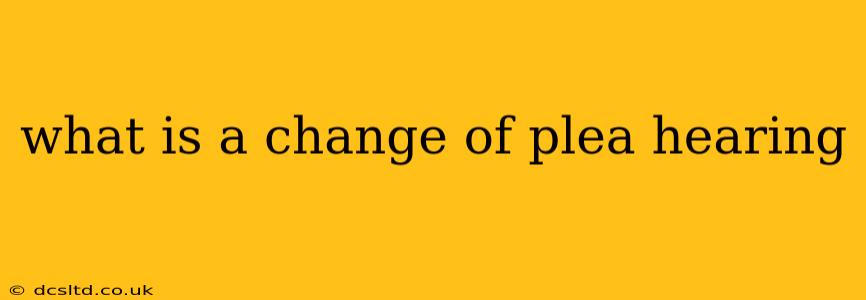A change of plea hearing is a court proceeding where a defendant formally alters their initial plea in a criminal case. Instead of maintaining their original plea (usually "not guilty"), they change it to a guilty plea, a no contest plea (nolo contendere), or, less commonly, to a plea of not guilty by reason of insanity. This crucial hearing significantly impacts the case's trajectory, often leading to sentencing or other legal consequences.
What Happens During a Change of Plea Hearing?
The hearing itself is a relatively formal affair. Here's a typical breakdown:
- Defendant's Appearance: The defendant must be present in court. This is non-negotiable.
- Verification of Understanding: The judge meticulously ensures the defendant understands the charges, the potential penalties (including prison time, fines, and probation), and the implications of waiving their right to a trial. This process involves detailed questioning to confirm the plea is voluntary and informed.
- Reading of the Charges: The court clerk or judge will read the charges against the defendant, ensuring complete understanding of the offenses pleaded to.
- Factual Basis: The prosecution often presents a factual basis for the plea. This involves summarizing the evidence against the defendant, demonstrating sufficient grounds for the guilty plea. The judge will assess whether the evidence supports the plea.
- Allocution: The defendant may be given an opportunity to address the court, often referred to as allocution. This allows the defendant to explain their actions or express remorse (although this is not required).
- Acceptance or Rejection of Plea: The judge reviews all information presented and decides whether to accept or reject the change of plea. A judge may reject a plea if they believe the defendant doesn't understand the consequences or if the factual basis isn't strong enough.
- Sentencing (Often): If the plea is accepted, sentencing typically follows immediately or is scheduled for a later date. The sentencing will be based on the plea agreement reached between the prosecution and the defense or determined by the judge according to sentencing guidelines.
What are the Different Types of Pleas?
Understanding the different types of pleas is crucial to grasping the implications of a change of plea hearing:
- Guilty Plea: This is the most common type of plea. By pleading guilty, the defendant admits to committing the crime(s) charged.
- No Contest Plea (Nolo Contendere): This plea means the defendant does not contest the charges but doesn't explicitly admit guilt. While it often results in the same consequences as a guilty plea, it can have implications for civil lawsuits later on.
- Not Guilty by Reason of Insanity (NGRI): This plea asserts that the defendant, due to a severe mental illness, lacked the capacity to understand the nature or wrongfulness of their actions at the time of the offense. This plea typically leads to a separate trial to determine the defendant's sanity.
Why Would Someone Change Their Plea?
Several factors might lead a defendant to change their plea:
- Strong Evidence Against Them: Overwhelming evidence presented by the prosecution might make a guilty plea seem like the best option to avoid a harsher sentence after a trial.
- Plea Bargain: A plea bargain is a negotiation between the prosecution and the defense where the defendant agrees to plead guilty in exchange for a reduced sentence or charges.
- Avoidance of Trial: A change of plea avoids the uncertainties and potential risks of a trial, including the possibility of a more severe sentence if convicted.
- Acceptance of Responsibility: Some defendants may genuinely accept responsibility for their actions and choose to plead guilty.
What if the Judge Rejects the Change of Plea?
If the judge rejects the change of plea, the case proceeds as if the original plea had remained in effect. This typically means the case will go to trial.
Can I Represent Myself at a Change of Plea Hearing?
While you have the right to represent yourself (pro se), it's strongly recommended to consult with an experienced criminal defense attorney. The legal intricacies involved in a change of plea hearing are complex, and an attorney can ensure your rights are protected and that you make informed decisions. The consequences of a plea are significant and far-reaching.
